Managing a business is no cakewalk for any entrepreneur. Not everyone has a natural talent to understand the various responsibilities that come under the ambit of business management.
Don’t worry! This guide to What is Business Management will help you understand what it takes to help an organization grow and prosper.
First, let’s get clear with the basics.
What is business management?
Business management is the process of overseeing and coordinating various organizational activities to achieve goals efficiently, including planning, organizing, leading, problem-solving, and controlling resources and business processes.
Business management ensures that all parts of the organization work together efficiently and effectively.
What are the types of business management?
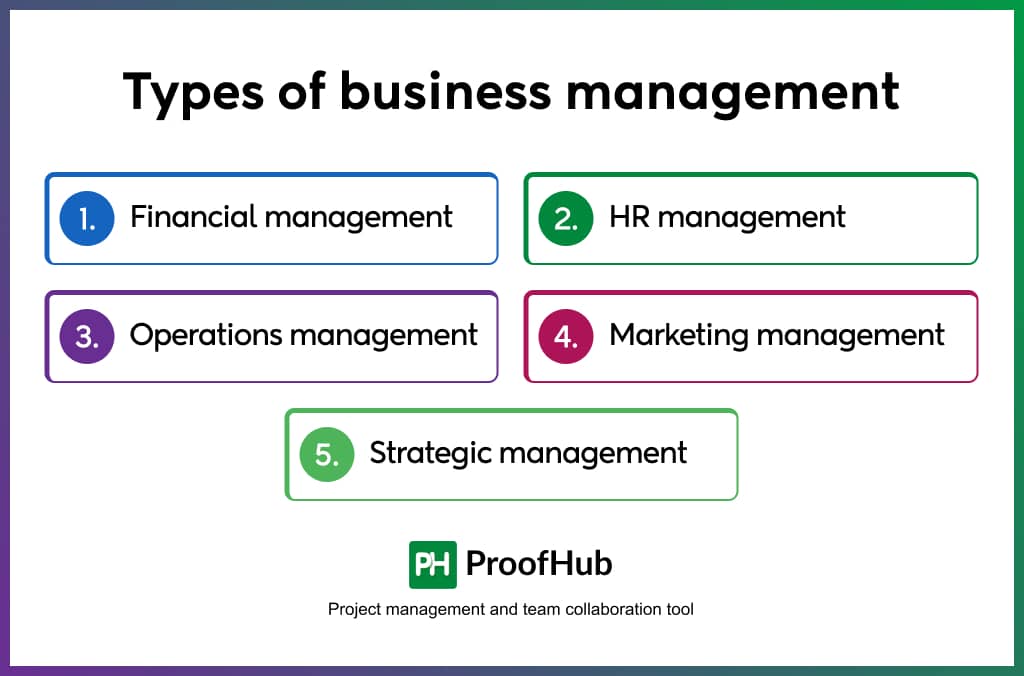
Although there are many types of business management, some of the major ones are given below.
1. Financial management
Financial management strives to balance profit and risk to ensure profit for the business.
It requires business managers to plan, direct, and coordinate with investing, banking, insurance, and other financial aspects of the business, which help them manage financial risk. Financial management has three critical elements – planning, control, and decision-making.
2. HR management
HR (Human Resource) management deals with a business’s hiring, training, and retention of an employee.
It is not the sole responsibility of the human resource management department to hire, retain, and recruit new employees. Even managers of every department take part in the recruitment cycle as they impact the future growth of an organization. Operations management requires business managers to ensure that all departments of an organization are functioning efficiently
3. Operations management
Operations management requires business managers to ensure that all departments of an organization are functioning efficiently.
They must deal with numerous departments and formulate the best business strategies and processes for this.
The operations teams must ensure proper acquisition, development, and supply chain management.
4. Marketing management
Marketing management considers the practical application of a business’s marketing resources. There are four core areas of marketing management – Company, Collaborator, Customer, and Competitor analysis.
Brand management, Marketing strategy, and pricing are three core components of effective marketing management.
5. Strategic management
The success of every business depends on its marketing, financial, and operational strategies. This is where strategic marketing comes into the picture. Strategic management refers to the application of strategic thinking to leading an organization.
It relies on questions like – Where does a business want to reach, and how can it get there?
Business managers must know a few practices to succeed in any business management described above.
What are the best business management tactics?
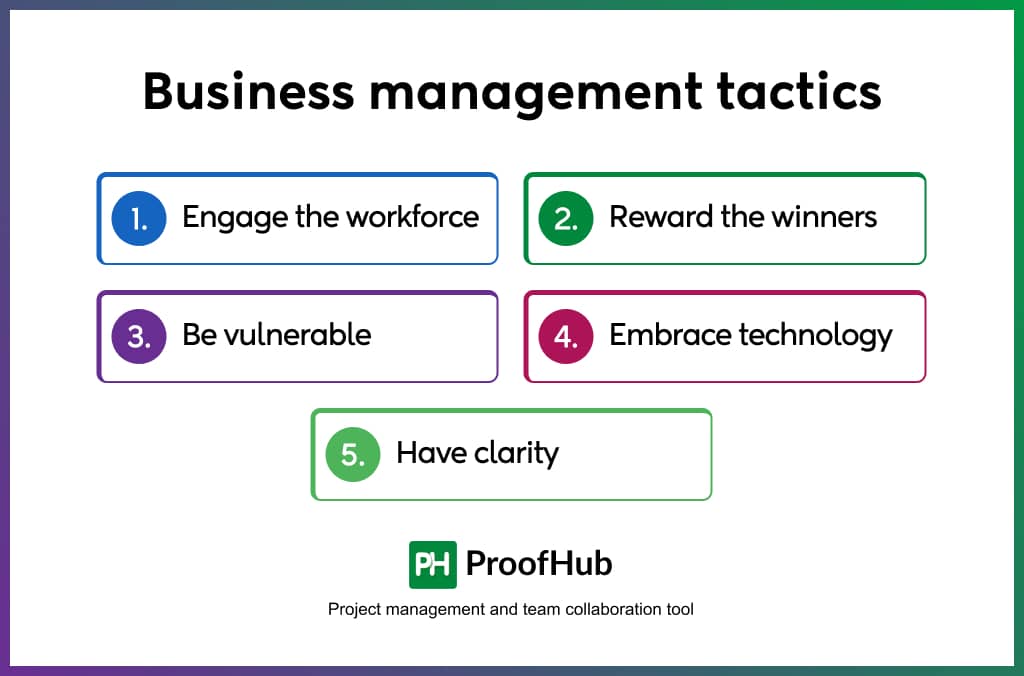
Below are 5 of the best business management tactics every business manager should use to help an organization grow.
1. Engage the workforce
No business has ever reached its goal without active and hardworking team members. Business managers must engage with team members from every department to motivate them.
A motivated and enthusiastic team member is likelier to help the organization achieve its business goal than an alienated worker who is more interested in a paycheck.
2. Reward the winners
Some business managers feel that connecting or praising team members on a personal level undermines their authority, but this is not so.
Nothing can replace an employee’s motivation after being praised for a job well done. Rewarding employees who help a business grow has a positive impact on others.
3. Be vulnerable
Many business managers believe that getting to know the employees makes them look weak, which is wrong.
Without the ability to be open and share their ideas regarding how a business should go, some business managers lose the team’s trust. This hurts the project’s and company’s future, not to forget it also impacts employee morale.
4. Embrace technology
Business managers need to be quick in adapting to the latest technology. It sends a positive message to the customers as well as company employees.
For example, in today’s world, it is vital for every business to not only have a website with smooth navigation and valuable content. Business managers must ensure that customers can connect with them from anywhere and anytime.
In the long run, if a business wants to stay ahead of the competition, then managers have to take up the mantle of adapting to the latest technology in their industry.
5. Have clarity
Many businesses cannot meet their goals due to a lack of clarity amongst managers who either don’t understand the organization’s vision or are confused about how to achieve it.
To counter this issue, organizations should help them understand a few key concepts;
- Why do we exist?
- What do we do?
- What is most important at the moment?
- Who must do what?
Answering these questions gives business managers a clear idea about the company’s vision, mission, and values.
There are different ways through which a business manager can help an organization grow and achieve its goal.
Let us now take a look at the different management styles.
What are different styles of business management?
Whether a business manager leads a department, team, or entire organization, getting familiar with the different management styles is vital.
Knowing about these is an essential part of understanding what business management is at its core.
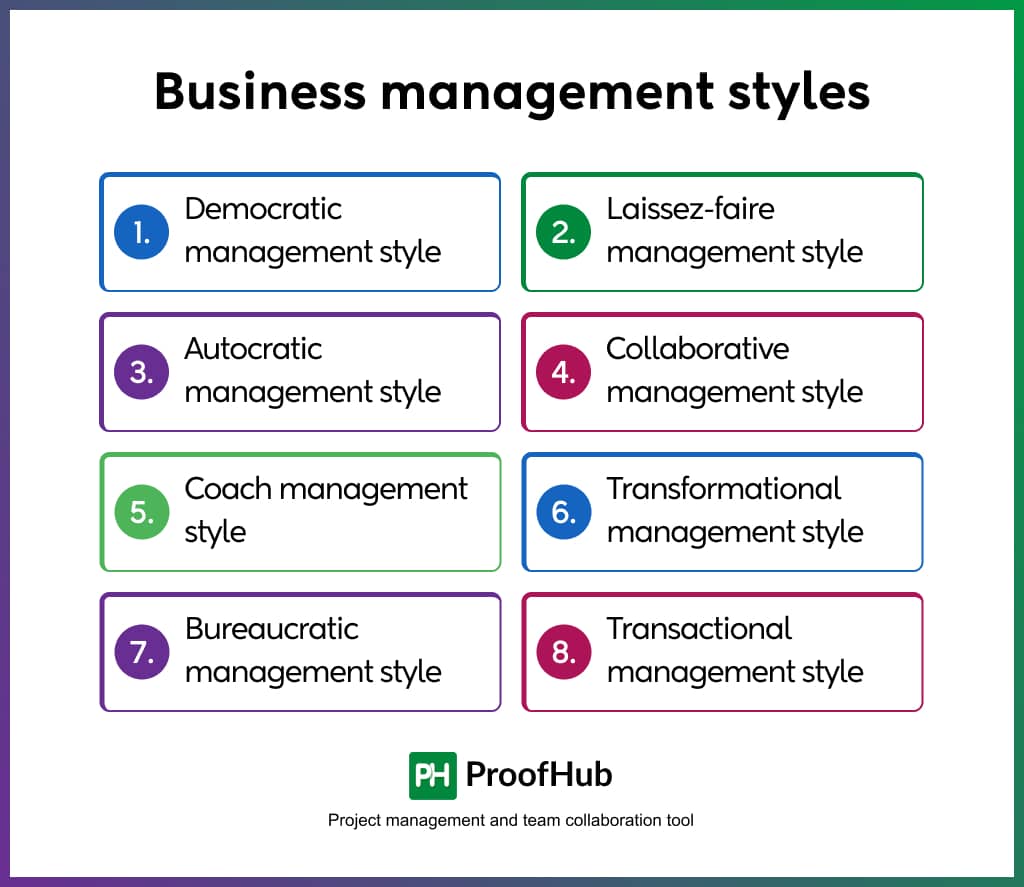
That said, given below are 8 business management types a business manager can adapt to.
1. Democratic management style
The democratic management style helps create trust and mutual understanding between an organization’s employees and the upper management.
The leaders usually seek input from the employees before making a business decision. Business managers who follow this style are open to experimenting with new ideas.
2. Laissez-faire management style
Business managers who adopt the laissez-faire management style do not believe in micromanaging employees.
Employees have complete freedom when working on a given task. It is the best management style for managing a team of highly experienced professionals.
3. Autocratic management style
Autocratic business managers believe in focusing on results and efficiency. They micromanage the workforce to ensure that everyone follows the organization’s policy.
This management style comes in handy when there are inexperienced employees who need clear and strict instructions regarding a task.
4. Collaborative management style
To attain a common objective, collaborative management requires coordination between managers, supervisors, and employees.
In this management style, all the employees from different departments work together to ensure the organization achieves its business objectives through strategic planning.
5. Coach management style
Business managers who possess the qualities of a sports team coach can adapt to the coach management style. They must focus on an employee’s development and know what motivates every team member.
Coach management style helps managers identify the strengths and weaknesses of every team member. It helps push an employee to perform beyond their limitations and improve their chances of growth.
6. Transformational management style
A transformational management style is an approach business managers use to help an organization move in the right direction.
A transformational business manager not only supervises the various changes taking place in an organization. They also help manage employee morale which might go low during such times.
7. Bureaucratic management style
The bureaucratic management style requires business managers to assign tasks to employees within a well-defined hierarchy.
This management style requires a focus on rules and procedures rather than collaboration. It is pretty successful in heavily regulated industries but not so much in creative industries.
8. Transactional management style
Following a transactional management style, managers believe in improving employee performance through bonuses and incentives.
They act as mentors and provide explicit instructions to increase performance and help employees meet the business’ expectations.
It has become easier for business managers to handle small and large teams within an organization with the help of various Business Management Systems available.
What is the role of a business manager in business management?
The end goal of every business is to generate profit. The person who has to ensure this happens to be none other than a business manager.
The business manager is a professional who oversees an organization’s employees and day-to-day operations. Their primary responsibility is to ensure that all business activities remain streamlined.
Business managers ensure this by executing relevant operational strategies, conducting employee performance reviews, and monitoring everyday activities. They must also search for opportunities to grow the business and achieve its objective.
Apart from this, Business managers keep an eye on all ongoing projects to determine any area of improvement, identify potential roadblocks, and solve them with strategic planning.
Still, all business managers need to possess a particular set of skills. Let us see what these are.
How to become a business manager?
Becoming a business manager is a lifelong learning process; however, to be in the position, you typically need prior knowledge. Below are some of the educational pathways and career roles associated with becoming a business manager.
1. Associate degree
An associate degree is a two-year degree program that provides foundational knowledge in business management. If you are looking to enter the workforce quickly or if you plan to continue your education, it’s a great starting point. After completion, you can either start looking for entry-level business roles or decide to pursue a bachelor’s degree.
Job roles you can expect:
- Administrative assistant
- Sales Associate
- Customer service representative
- Office Manager
- Marketing Coordinator
2. Bachelor’s degree
A bachelor’s degree in business management is typically a 4-5-year program. You can pursue this degree at a traditional college or university or enroll in business degrees that help you learn on your schedule through online programs that offer flexibility.
Job roles you can expect:
- Business analyst
- Human resources specialist
- Marketing Manager
- Financial analyst
- Project Coordinator
3. Master’s degree
Postgraduate education in business management is typically a one-year or two-year program. While the Master of Business Administration (MBA) is the most popular choice, there are other courses to consider. This degree offers specialized knowledge in business management and is for all those seeking senior or higher-level roles.
Job roles you can expect:
- Senior project manager
- Business development manager
- Operations director
- Management consultant
- Financial manager
4. Doctorate degree
For business graduates interested in academia, high-level consulting, or executive roles, a doctorate like the Doctor of Business Administration can be pursued. Depending on the individual’s pace, this program usually lasts 3 to 6 years.
Job roles you can expect:
- University professor
- Research Analyst
- Senior management consultant
- Chief Executive Officer (CEO)
- Director of Business Development
What are the salaries in business management?
According to the US Bureau of Labor Statistics (BLS), the period from 2022 to 2032 will witness more employment growth than average in business and financial occupations.
Some occupational salaries as per BLS are:
| Job Title | Salary | Education |
| Financial Analyst | $99,890 | Bachelor’s degree |
| Research Analyst | $74,680 | Bachelor’s degree |
| Human Resource Specialist | $67,650 | Bachelor’s degree |
| Project Management Specialist | $98,580 | Bachelor’s degree |
| Budget Analyst | $84,940 | Bachelor’s degree |
| Job Analysis Specialist | $74,530 | Bachelor’s degree |
| Training and Development Specialist | $64,340 | Bachelor’s degree |
What skills should a business manager have?
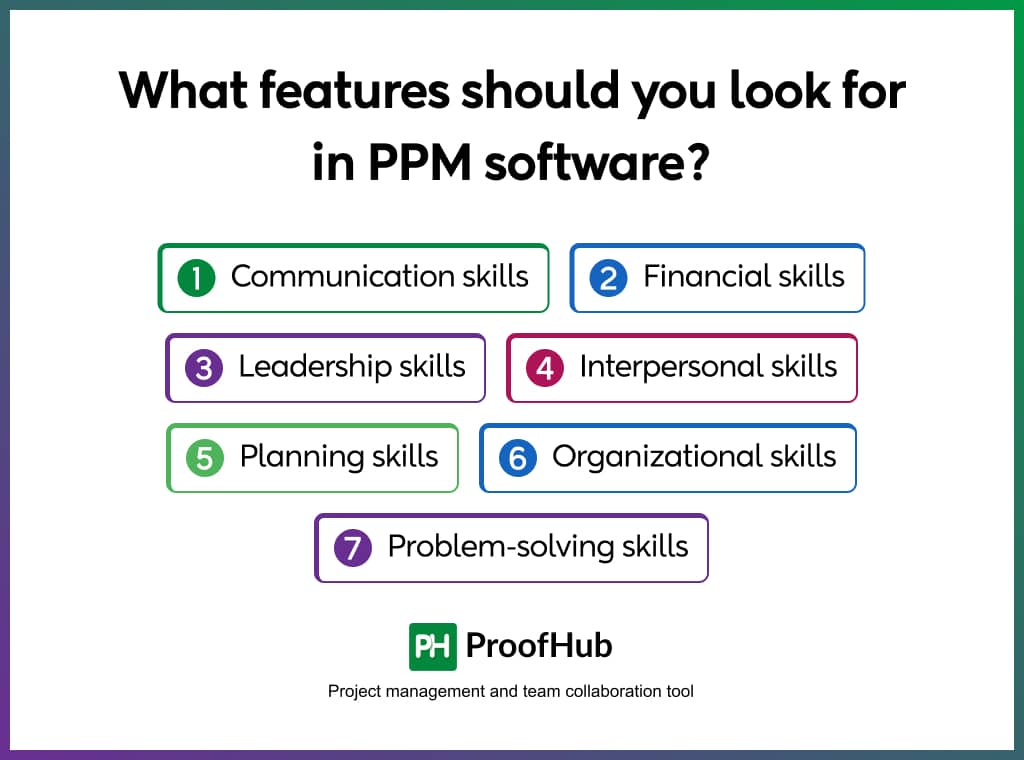
A business manager has to supervise different teams to help them achieve the desired business goal and obtain maximum workplace productivity.
Therefore, anyone looking to get into one of the many business management jobs should possess the skills mentioned below;
1. Communication skills
A business manager has to communicate with project team managers, stakeholders, and higher management. They impact workplace communication by building positive and trustable relationships with the employees, management, and business owners.
They must remain connected with the organization’s employees and ensure successful customer engagement. But, for this to happen, they must possess excellent command over verbal and written communication.
| Stat Fact: 71% of employees feel productive when they are well-connected to their colleagues – The Connected Culture Report |
2. Financial skills
A business manager has to form financial plans by setting a budget and completing it within that budget. They have to ensure the project teams work according to the allocated budget.
Many business management tools can help managers build financial statements with ease. Managing the project budget ensures the team completes it within the deadline and it is delivered to the client on time.
3. Leadership skills
Business managers shape the business architecture with their leadership skills. There is a big responsibility on their shoulders to boost the morale of the workforce in the organization. A motivated employee will always give their best in comparison to undervalued employees.
Business managers can do this by interacting with every team socially, providing opportunities for career advancement, and recognizing high-performance team members.
4. Interpersonal skills
Business managers have to communicate regularly with different departments in an organization. Sometimes, they have to mediate between two departments that don’t see eye to eye on a project.
The departments must trust the business manager. For this, business managers should organize team-building activities and social events. This helps them know the employees on a personal level.
5. Planning skills
Business managers play a vital role in handling day-to-day tasks with accuracy and precision. However, at the same time, they also need to focus on the bigger picture.
They need to ensure that every task a team completes helps bring the organization closer to its business goal.
A business manager must have a vision of how today’s decisions will impact the business’s future in the coming years.
6. Organizational skills
Business managers have to don many different hats at the same time. For this, they must effectively organize and prioritize time to ensure every task is completed on time.
A capable business manager must be able to delegate tasks to different team members after a thorough task analysis while managing workload. It requires them to know the individual skills of every team member before assigning tasks.
7. Problem-solving skills
Business managers have to make decisions that significantly impact an organization’s future.
This includes making quick decisions regarding a project or completing a task without spending too much time on it. They have to think quickly about the pros and cons of a decision.
For this, business managers need to develop a keen eye regarding what is happening in the company. This helps them detect problems and take corrective measures before it is too late.
These are the essential skills that a business manager should have to excel at what they do. However, one more thing can help them cover a long journey with the organization.
What are the responsibilities of a business manager?
A business manager is the backbone of an organization, juggling various responsibilities to ensure smooth business operations. They have a significant influence on organizational culture.
Although different organizations have unique demands from them, here is a breakdown of the typical job responsibilities they manage daily.
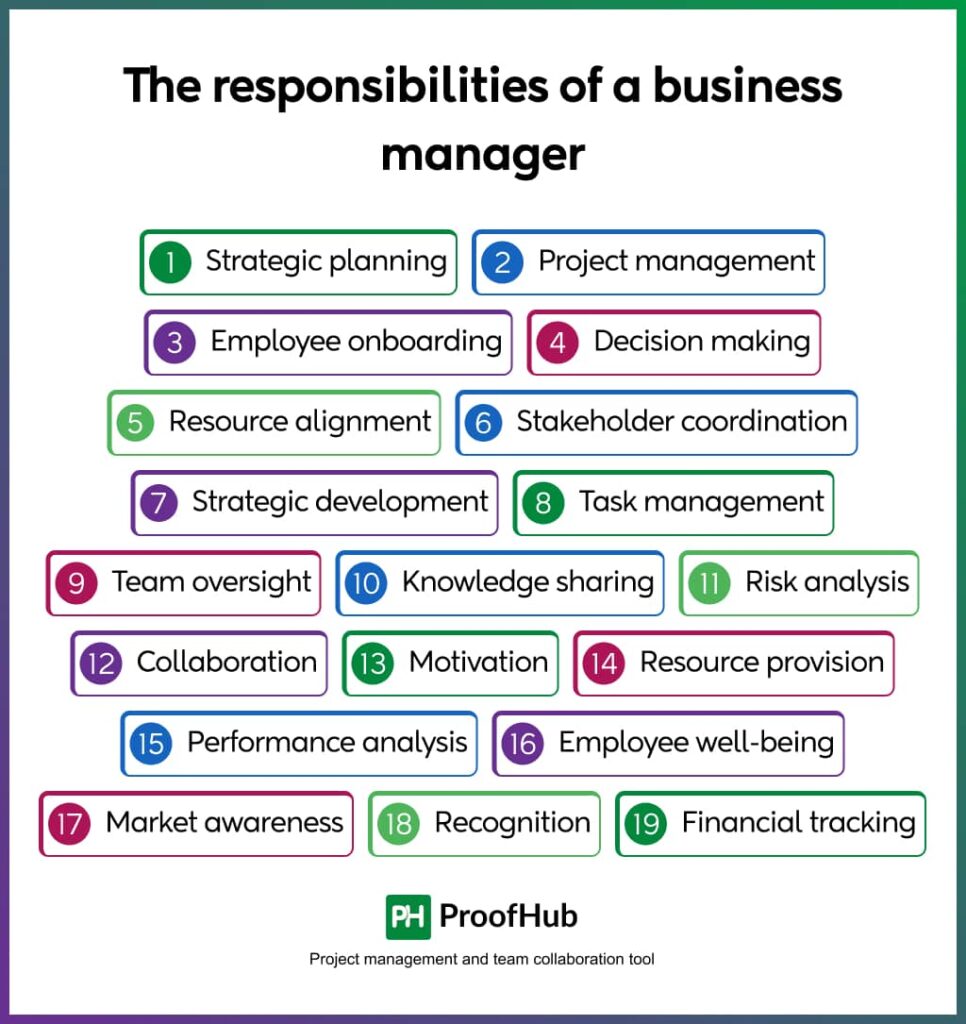
- Strategic planning: Work with the board of directors to set long-term strategic objectives and goals.
- Project management: Set project vision, define scope, and create a detailed timeline.
- Employee onboarding: Collaborate with HR to onboard new employees
- Decision making: Use critical thinking to make strategic decisions that best align with business objectives.
- Resource alignment: Bring resource efforts in alignment with defined goals effectively.
- Stakeholder coordination: Coordinate with external stakeholders, clients, vendors, or partners to meet their needs and expectations.
- Strategic development: Develop strategic plans after thoroughly evaluating business internal and external parameters using techniques like SWOT analysis.
- Task management: Managing tasks like work delegation, staffing, and supply chain management.
- Team oversight: Monitor team performance, track progress, and ensure quality outcomes.
- Knowledge sharing: Encourage knowledge sharing among employees to avoid information silos and improve team collaboration
- Competitor and risk analysis: Participate in competitors analysis and assess risks to develop contingency plans.
- Collaboration: Facilitate real-time collaboration among teams to enhance team coordination and productivity.
- Motivation and guidance: Motivate team members, providing guidance, feedback, and support whenever required.
- Resource provision: Ensure employees have the necessary resources to perform their tasks.
- Performance analysis: Evaluate project performance against objectives and make improvements as needed.
- Employee well-being: Create a positive work environment that prioritizes employee well-being, satisfaction, and retention.
- Market awareness: Stay in sync with market trends, innovations, and technological advancements
- Recognition: Recognizing and appreciating employee achievements and efforts to maintain morale.
- Financial tracking: Monitor financial metrics, identify areas for improvement, and report to senior management.
What is the difference between a business manager and a business administrator?
| Business Administrator | Business Manager | |
| Definition | A business administrator is responsible for running a business’s day-to-day operations. | The business manager focuses more on overall leadership to help an organization grow. |
| Skills | Analytical, strategic planner, detail-oriented, organized | A motivator, creative and innovative thinker, ability to see the bigger picture, able to delegate tasks |
| Career Options | Staff accountant, business analyst, marketing specialist, and HR administrator | Operations manager, financial reporting manager, and management analyst |
Still, there are business owners who think that business management is just a single industry. That is not so.
So, knowing about its various types will help you understand business management especially if you are just starting as a business manager.
What is a business management system?
Whether you own a small online store or multiple ventures, there is a lot you need to do to handle both. It is here that having a well-defined business management system can help manage complex tasks easily.
By definition, a business management system refers to a set of tools for planning and implementing the various policies, guidelines, and procedures of an organization to execute its business plan.
A Business Management system lays a solid foundation for successfully implementing strategic and tactical business decisions to meet its objectives.
“In 2020, 54% of enterprises agreed that cloud-based Business Intelligence was vital to their current and future initiatives”. – Forbes
How can ProofHub help in managing business?
ProofHub is a cloud-based business management system that helps businesses keep everything organized in one place.
It is one of the best tools for business managers to streamline daily business operations and assign tasks effortlessly.
That is not all! Given below is how ProofHub can help manage businesses with ease.
1. Task management
ProofHub lets project and business managers easily create, manage, and track assigned tasks. The Kanban boards and Gantt chart help plan and lay down every task visually appealingly.
It lets you set task deadlines, get instant notifications regarding a task, and check out the overall project workflow.
2. Project collaboration
ProofHub keeps every project team member on the same page with its effortless collaboration capabilities.
It also offers live chat and discussions to let project managers connect with team members round-the-clock.
Notes in ProofHub lets managers jot down vital information in one place and share it with the team members.
3. Time management
ProofHub timer tool lets managers keep track of the time spent by a team member on a particular task.
The time logging, monitoring, and reporting feature helps increase employee accountability. The Timesheets in ProofHub, help display time, logged in by a project team member.
ProofHub comes with many advanced features like time tracking to help you keep track of every task in a project.
4. File management
ProofHub comes with smart file storage, versioning, and sorting capabilities. Its file management system offers 100 GB of file storage space for all projects.
This business management tool lets managers upload and divide files into separate folders. ProofHub also provides the option of attaching files to team chats and discussions.
5. Progress tracking
The project reporting feature in ProofHub lets managers know if a project is completed on time or lagging.
It gives them enough time to take the appropriate action before things go out of hand.
ProofHub’s Activity Tracker makes tracking any modifications or changes to a project file easier.
Conclusion
Business management is the backbone of any successful organization; it includes understanding the business requirements, managing daily operations, and implementing effective strategies. Business managers play a vital role in the growth of an organization and its long-term success. We hope you now better understand business management and its importance.
Related articles
- 21 Best business management software you should be using today
- What is resource management? Why should it be your top priority?
- How to conduct an effective SWOT analysis
FAQ’s
What are the most important components of effective business management?
Six vital components contribute to effective business management. These include strategy, marketing, finance, human resources, technology, and operations.
What skills do I need to learn to become a business manager?
To become a proficient business manager, there are 7 skills you need to learn:
- Sound decision-making
- Self-Awareness
- Building Trust
- Becoming a good communicator
- Regular Check-Ins
- Self-Reflection
- Business Management Training
Are there alternative careers in the field of business management?
Yes! Like every profession, business management is a skill required to succeed not only in the corporate world but also in other industries like:
- Non-Profits
- Public Service
- Entrepreneurship
- Private Consultancy

